- Home
- Q. Patrick
Death for Dear Clara Page 2
Death for Dear Clara Read online
Page 2
“Hello, Mr. Tolfrey.”
Tolfrey’s pouched, yellowish eyes stared in complete lack of recognition; then they screwed themselves into a shrewd smile.
“Ah, yes! You’re the fellow who’s going to maul ’em, maim ’em and murder ’em.” His gaze moved derisively over the smoke-blue suit and the suède shoes. “Well, Jack the Ripper, join me in a little stimulant.”
“I think I’d prefer a morsel of food, Mr. Tolfrey.” Derek Muir had chosen a stool which permitted him a view of his face in the mirror behind the bar. “After a three days’ fast, one is apt to feel depleted. A chicken sandwich, please. And a glass of milk.”
The barman looked doubtfully at Tolfrey and then seemed to find reassurance in Muir’s sartorial extravagance.
“So the killer drinks milk!” Tolfrey was chuckling.
“You’d hardly have me visit Mrs. Van Heuten under the influence, would you?”
“That’s ri’.” Tolfrey shot him a quick sidewise glance. “Wouldn’t do at all. Clara’s quite a stickler; most respectable woman in New York.”
“Oh,” murmured Muir as he watched his reflected lips curl around the first bite of the chicken sandwich.
The barman had set the check down in front of Tolfrey.
“You taking care of this, Mr. Tolfrey?”
“Ah, yes.” Dane Tolfrey stared at it solemnly. Then, with a flourish, he pulled out his wallet and registered unconvincing surprise at its emptiness. “Tcha, forgot to go to the bank. I’ll have to sign.”
His jovial smile caused no stir on the blank surface of the barman’s face.
“Sorry, Mr. Tolfrey. Terms strictly cash. Told you before.”
“Damned embarrassing!” Tolfrey glanced at Muir who had carefully hidden his face in his glass of milk. “Say, old fellow, I know I invited you. But—”
“I’d be only too glad.” Placidly Muir wiped a delicate foam of milk from his mouth. “But I’m afraid you’ll have to wait until your friend Mrs. Van Heuten has put my art across with the Great American Public. At the moment I have no currency except a Los Angeles trolley token.”
“This,” murmured Tolfrey, “would be what is commonly called a predicament, if I didn’t know everyone in New York.”
His gaze roved unsteadily along the almost deserted bar and lighted on a man in tweeds who sat at the extreme end behind a large stein of beer.
“And this,” he exclaimed, “is what is commonly called a break.”
Slipping from his stool, Tolfrey crossed the room and slapped the man heartily on the back.
“Why, Johnny, what on earth are you doing in New York?”
The man in tweeds turned on him a pair of insolent eyes just a shade more brown than the healthy tan of his face. A muscular arm stretched lazily toward the stein of beer.
“I’m not in New York.” His smile was pleasant, but somehow less healthy than his appearance. “Listen, Tolfrey, I don’t know you and you don’t even know my name which happens to be John Smith. See?”
“Vacationing husband, eh?” Tolfrey laid a puffy finger against the red veins of his nose. “Well, Johnny, you can be John Smith, John Doe or John Raskob, if you’ll help me out with a little problem of a check.”
“Why, of course.” The man in tweeds was smiling almost too pleasantly now. “I’ll even buy you another drink for old time’s sake.”
Summoning the barman, he gave the order, adding with a nod at the abandoned Derek Muir:
“You might include another glass of milk for that solitary flower up there.”
“I suppose,” Dane Tolfrey had moved closer, impregnating his whisper with confidential fumes of brandy, “I suppose you’ve come to New York incognito to square a certain little account, Johnny. About time, eh?”
“Marvelous, my dear Holmes.” Only five brandies could have blinded Tolfrey to the menace which now lurked in that casual tone and in the deceptive velvet of the other man’s eyes. “My dastardly secret lies revealed. I am going round this afternoon to settle a certain little account with a certain lady whom we both know.”
A brown hand gripped Tolfrey’s arm as it stretched to take the sixth brandy from the barman.
“Wait a moment, Tolfrey. Let’s drink to her.”
The man in tweeds raised his beer mug with mocking gallantry.
“To our mutual friend, the incomparable Clara Van Heuten. And may she soon arrive at that particularly uncomfortable place which is certainly being reserved for her in Hell.”
Tolfrey’s fingers froze around his glass. He stared at the other man in amazement.
“You’ll regret that,” he said, and then added with a forced laugh, “unless, of course, you’re drunk.”
“Drunk? On the contrary. I’m just sobering up.”
The man who had called himself John Smith swung off his stool. The brown eyes were hard as agate now.
“By the way, Tolfrey, you’re not drunk yourself, are you?”
“Me?” Tolfrey’s tone expressed the indignation of a man who had not been completely sober for many years. “Drunk? Of course not.”
“Excellent. Then there’s nothing to prevent me from doing something I’ve been wanting to do for a long time.”
While Tolfrey gazed in bleary incomprehension, the man in tweeds pointed gravely to the floor.
“Would you rather your head landed in this cuspidor, or that cuspidor?”
“Johnny, you wouldn’t dare…”
But the half-voiced protest was never finished. A brown fist had flashed forward. It struck with perfect precision square on Tolfrey’s chin. Behind the blow had been a perfectly conditioned hundred and eighty pounds and an even greater weight of contemptuous rancor.
Tolfrey staggered, flung an ineffectual hand against the bar and crumpled to the floor.
The man in tweeds contemplated him a moment with an expression of infinite satisfaction. Then he grinned at the startled barman and tossed him two five dollar bills.
“That’s the best ten bucks’ worth I ever had. Keep your mouth shut, and the change.”
Wiping a trace of blood from his knuckles, he pushed through the small crowd of onlookers and strode, whistling, away.
When Tolfrey regained consciousness a few seconds later, he found himself gazing at the anxious face of the barman. With attempted dignity, he removed his head from the cigar and cigarette stubs of the cuspidor. Ignoring several facetious offers of help, he rose painfully to his feet.
The barman grinned and pushed a half tumbler of brandy toward him.
“On the house, Mr. Tolfrey. Boy, that was a daisy!”
“I shall prefer no charges against him,” said Tolfrey with unsteady pomposity as he smoothed the tobacco ash from his thinning hair. “And I suggest you forget the incident. Where’s the other gentleman?”
“You mean the guy that socked you?” asked the barman, solicitously whisking the back of Tolfrey’s coat.
“I said gentleman.”
“Oh, the milk-fed chicken sandwich!” The barman affected a mincing drawl. “He scrammed as soon as the shooting began. I guess the sight of blood made him feel faint.”
“So that’s Mr. Muir,” muttered Tolfrey to himself. “And it’s also the end of Mr. Muir.”
With a stagger that was slightly more pronounced than usual, he moved toward the door. He would go round to see Mrs. Van Heuten immediately and let her know his opinion of Mr. Muir.
But a sudden dizziness made him feel an urgent need to sit down and deflected his steps to the adjoining restaurant. Rather dazedly, he attained the nearest table and lowered himself into a chair. He was not conscious that the table was already occupied.
“I’m sorry, but I’m keeping that place.”
Tolfrey shook himself and peered at the young man seated opposite him; a rather untidy boy with long, unkempt hair and a drawn, sensitive face. Recognition slowly dawned.
“Know you,” he muttered uncertainly. “Know everyone in New York. You’re one of Clara’s young literary geni
uses, Bobby Bristol.”
“Yes. It’s Mr. Tolfrey, isn’t it?” The boy seemed abstracted. “I’m sorry to sound inhospitable, but I’m expecting my wife.”
“That’s all ri’. Just thought the last of the wealthy Bristols might stand a lunch to the last of the impoverished Tolfreys.”
“The wealthy Bristols!” The boy laughed rather bitterly. “It might interest you to know that the Bristol fortune now stands at exactly two hundred and eighty-six thousand, seven hundred and forty dollars. Unfortunately for the last of the Bristols, it’s on the wrong side of the ledger.”
“Too bad,” clucked Tolfrey sympathetically. “All the best people bust these days. So’s my jaw.” He fingered his swollen chin. “If not a lunch, how about a little piece of bleeding beefsteak to soothe an aching face?”
But Robert Bristol had not been listening. He had sprung to his feet, a sudden smile transfiguring his uncertain features. With eager eyes he was watching a girl who moved briskly through the tables toward them.
Dane Tolfrey saw that expression. Shaken and befuddled though he was, he could not fail to realize that he was not wanted. He rose and lumbered away.
Bristol moved forward impulsively to meet the girl.
“Helen! Thank God, you’ve come. I—I thought, perhaps…”
“Hello, Bobby.”
Helen Bristol’s green eyes were guarded as they returned her husband’s long, anxious gaze. She was handsome in an abrupt, brittle way with decided features and an uncompromising chin. Pulling off a pair of gray gloves and stuffing them nervously into her bag, she sat down in the seat vacated by Tolfrey.
“It’s nice to see you again, Bobby.”
Her cool tone and the presence of a waitress checked the flood of words which had risen to Bobby’s lips. The two of them sat in awkward silence while the food was ordered and served. The girl lit a cigarette, inhaled jerkily and then stubbed it. They made a pretense of eating.
“Well, Bobby, how’s the novel?” Helen Bristol’s voice broke the tension—too bright, too well-controlled. “Finished it yet?”
“It’s been at Salter’s three weeks. Didn’t you know? You’re still working there, aren’t you?”
“Yes. But I don’t have anything to do with manuscripts.” The girl pulled off a fragment of bread and then let it drop back on the plate. “That’s Larry Graves’ job. I do hope he takes it, Bobby.”
“God, Helen, I hope he does. It means so much. Mrs. Van Heuten’s seen it, you know. She’s enthusiastic, thinks it’s better than Parabola and—” Bobby Bristol broke off, leaning across the table and taking his wife’s hand impulsively. “Listen, Helen, I can’t stand it any longer. You’ve been gone three months now. They’ve been three months of hell. I can’t write, can’t sleep—can’t do anything. You—you are coming back to me, aren’t you?”
Helen Bristol made as though to draw her hand away and then let it lie passive in her husband’s.
“Bobby, I don’t know how to tell you. I…”
“But you must come back.” Robert Bristol’s voice was low, desperate. “There—there wasn’t ever anything really the matter, Helen. We fought at times. But it was just all the strain; my money going; having to move into that beastly little apartment; father’s creditors…”
“No, Bobby.” The girl’s voice was very firm now. She was staring him straight in the face. “We separated for three months to see how it would work out. We promised to be absolutely frank. And that’s what I’m going to be. I can’t come back.”
The color drained from Robert Bristol’s cheeks.
“You don’t mean that, Helen.”
“I do, Bobby. I hate myself. But—but well, now I’m working again at Salter’s, I find I’m happy. I like my job.”
“But you wouldn’t have to give up your job.” Bobby Bristol forced a laugh. “We’d be needing the money until I can sell the book or something else turns up.”
Helen Bristol looked away. Her fingers started to shred a lettuce leaf which had garnished her untouched salad.
“You see, Bobby, it’s not just that. I can’t come back to you because—there’s someone else.”
The corners of Robert Bristol’s mouth trembled. He looked like a hurt, bewildered child.
“It isn’t true,” he whispered.
“It is, Bobby. Don’t think I haven’t worried it out in my mind. You’ve got to see my point of view. I suppose I could throw everything up. But in the long run unselfishness doesn’t get you anywhere. I guess we just shouldn’t ever have married. You’re temperamental. And I—” a light smile curved her determined lips—“well, I’m older than you and I’m afraid I’m far too matter-of-fact to be the wife of an author. Let’s cut clean, Bobby. I want a divorce.”
“Divorce? God, that’s funny.” Robert Bristol laughed unsteadily. “An inheritance of debts and a wife who wants a divorce. If frustration makes the genius, my next book’s going to be a masterpiece.” He rose to his feet. “I think I’ll go right round and work out a synopsis of my life with Mrs. Van Heuten.”
The girl’s face hardened. “No. Don’t do that, Bobby.”
“And why not?” Robert Bristol’s voice was harshly sarcastic. “After all, now you’ve decided to live your own life, Mrs. Van Heuten’s the only real friend I’ve got. She’s the only one who’s had the decency to stick by me.”
Jerkily, he swung away from her through the crowded tables.
“Bobby…!”
Helen Bristol’s eyes had not lost their determination, but there was a trace of anxiety in them as she watched her husband hurrying away. Slowly, she took the gray gloves from her pocketbook and started to pull them onto her fingers.
“Poor Bobby,” she thought. “I suppose he’s right. He doesn’t have anyone now but that woman—that damnable Mrs. Van Heuten.”
II
“Clever … unspeakable … mysterious … respectable … incomparable … decent … damnable.”
All these adjectives had been applied to Clara Van Heuten during the past hour while she was lunching in pleasant oblivion at her club. Now, as she sat once again at her desk, none of these epithets seemed particularly apt. One word alone could have described her with accuracy—serene. Her white hair gleamed serenely in the afternoon sunlight. Serene shadows from the golden chrysanthemums at her side played softly on her delicate, well-manicured hands. And the tiny lines around her mouth and eyes showed that she was serene in her acceptance of encroaching age.
Occasionally Mrs. Van Heuten would turn from the manuscripts she was reading to scribble a note on a piece of paper—a suggested touch of realism for dear Mrs. Derain’s little vignette; a toning down of the surprisingly youthful third line of old Professor Stansbury’s sonnet. Mrs. Van Heuten had trained herself to take seriously her clients’ minor masterpieces. That was one of the secrets of her success as a business woman—and as a friend.
She glanced up as her substitute secretary appeared from the outer office.
Madeleine Price, sister to Mrs. Van Heuten’s regular secretary, had been sole staff at the Advice Bureau for less than a week, and her employer still felt a slight shock each time she was confronted with the girl’s disturbingly unpretty face. It was remarkable, she reflected, that Louise should have so different a sister.
“What is it, dear?”
“There’s a man in the office who says he’s come in answer to your letter—a Mr. John Smith.”
“Smith?” The warm motherliness of Mrs. Van Heuten’s tone chilled perceptibly. “I don’t think I—Oh, yes, these authors with pen names! How stupid of me. Show him in, dear.”
John Smith was shown in. He was the man in tweeds who had recently made reservations of a particularly uncomfortable sort for Mrs. Van Heuten. Now he smiled blandly at her as he swung himself into a chair with the effortless ease of a polo player mounting a pony. His brown velvet eyes flicked with lazy insolence over the departing Miss Price.
“Who’s the gargoyle, Clara? Don’t tell me Loui
se has left you.”
“No, poor Louise’s baby girl’s been quite ill. She’s had to take her out to the country. That’s her sister, Madeleine. She’s just helping me out until Louise can get back.”
The young man indifferently flicked a cigarette to his lips.
“Well, Clara, I boarded a plane as soon as I got your letter. Drank your health with friend Tolfrey over lunch. And here I am. Just why are you so eager to see me?”
“Surely you must know, John.” Mrs. Van Heuten made a little moué which was both winning and reproachful. “I simply hate having to discuss business, but I don’t think you’ve treated me very well.”
“On the contrary, Clara, I’m the Literary Advice Bureau’s best advertisement—a successful and satisfied client.”
“But I’m not satisfied,” said Mrs. Van Heuten with sorrowful determination. “You know how informal I am, John. I charge very small fees to young—er—authors who are promising. But I do expect them to abide by the terms of our initial agreement and to give me a reasonable percentage of what they earn after I have helped them to find profitable markets.”
“I admit I owe you a deep debt of gratitude, Clara. But I would hate to insult an old friend by paying this debt in anything more tangible than gratitude.”
“Really, this is unpardonable.” Mrs. Van Heuten flushed with indignation. “I’ve had a hard, up-hill time since I started this little business, John, but I’ve always dealt with gentlemen. You’re the first client to take a dishonest advantage of me.”
“And what are you going to do about it? Put Tolfrey on my trail?” The man in tweeds grinned down reminiscently at the recent abrasion on his brown knuckles.
They sat a moment in silence; the handsome, white-haired woman and the powerful, nonchalant young man. Mrs. Van Heuten picked up her engraved steel paper-knife and tapped on the desk.
“No, John. There is someone else I could discuss the matter with. I think you know who I mean.”
John Smith laughed. “You’re a wonderful woman, Clara, but an indifferent bogey man.”

 Death Goes to School
Death Goes to School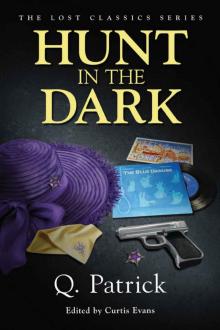 Hunt in the Dark
Hunt in the Dark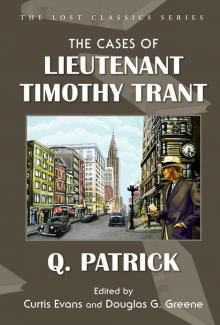 The Cases of Lieutenant Timothy Trant (Lost Classics)
The Cases of Lieutenant Timothy Trant (Lost Classics)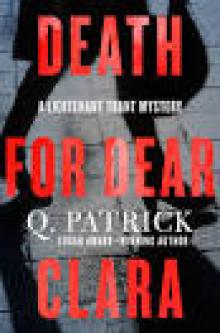 Death for Dear Clara
Death for Dear Clara S.S. Murder
S.S. Murder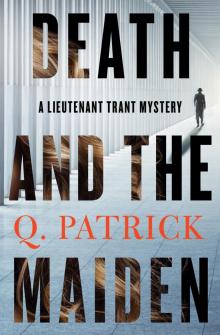 Death and the Maiden
Death and the Maiden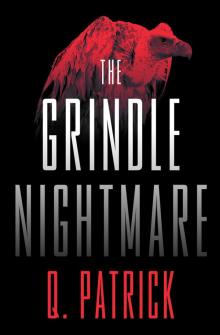 The Grindle Nightmare
The Grindle Nightmare Cottage Sinister
Cottage Sinister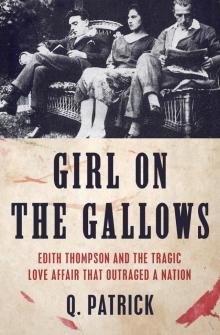 The Girl on the Gallows
The Girl on the Gallows